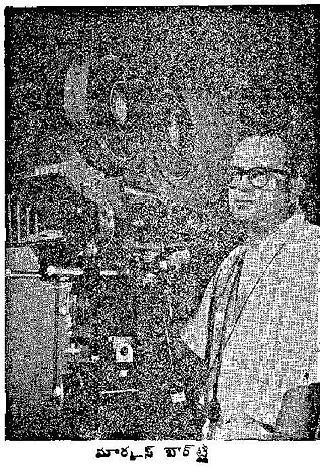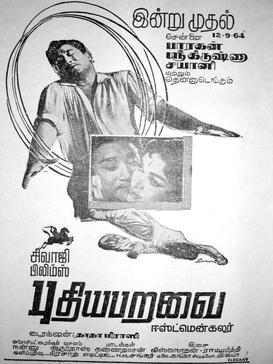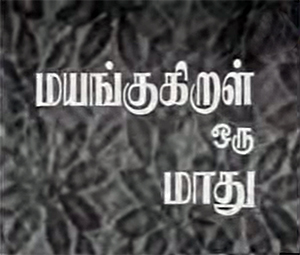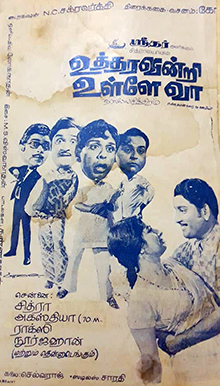
Panam Padaithavan is a 1965 Indian Tamil-language film produced and directed by T. R. Ramanna, and written by Sakthi T. K. Krishnasamy. The film stars M. G. Ramachandran, Sowcar Janaki and K. R. Vijaya. It was released on 27 March 1965.

Galatta Kalyanam is a 1968 Indian Tamil-language romantic comedy film directed by C. V. Rajendran and written by Gopu. The film stars Sivaji Ganesan and Jayalalithaa. It is based on Gopu and Sridhar's play of the same name. The film, released on 12 April 1968, was later remade in Malayalam as Snehikkan Samayamilla and in Kannada as Aliya Devaru.

Kasethan Kadavulada is a 1972 Indian Tamil-language heist comedy film written and directed by Chithralaya Gopu. The film stars Muthuraman and Lakshmi, with M. R. R. Vasu, Thengai Srinivasan, Srikanth, Moorthy, Manorama, Rama Prabha and Jayakumari in supporting roles. It focuses on a young man (Muthuraman) collaborating with his cousin (Srikanth) and friend (Srinivasan) to steal money from his stingy stepmother (Manorama).

Paava Mannippu is a 1961 Indian Tamil-language drama film directed and edited by A. Bhimsingh, who co-produced it under his banner Buddha Pictures, with AVM Productions. The film features an ensemble cast of Sivaji Ganesan, Gemini Ganesan, Savitri, Devika and M. R. Radha. M. V. Rajamma, V. Nagayya, S. V. Subbaiah and T. S. Balaiah play supporting roles. It revolves around four children who are separated from their parents in childhood, then found and raised by foster parents of different religious backgrounds.

Iru Kodugal is a 1969 Indian Tamil-language drama film directed by K. Balachander. The film stars Gemini Ganesan, Sowcar Janaki, Jayanthi, Nagesh, V. S. Raghavan, S. N. Lakshmi and others. The story revolves around one man who was married to two women. Iru Kodugal won the National Film Award for Best Feature Film in Tamil, the first film by Balachander to win the award. The film, which was based on a stage play of same name, was remade in Kannada as Eradu Rekhegalu, in Telugu as Collector Janaki and in Hindi as Sanjog.

Marcus Bartley was an Anglo-Indian cinematographer known for his works predominantly in Telugu cinema along with a few Hindi, Malayalam, and Tamil films. He was the cinematographer of all time classics like Shavukaru (1950), Pathala Bhairavi (1951), Missamma (1955), Maya Bazaar (1957), Gundamma Katha (1962), Chemmeen (1965), Ram Aur Shyam (1967). He won the National Film Award for Best Cinematography in 1970 for Shanti Nilayam. He also won the Gold Medal at the Cannes Film Festival for Best Cinematography, becoming the first Indian to win the award.

Apoorva Sagodharargal is a 1949 Indian Tamil-language action film directed by Acharya. The film which was adapted from Alexandre Dumas' 1844 novella The Corsican Brothers stars M. K. Radha and P. Bhanumathi, with Nagendra Rao and Suryaprabha playing supporting roles. It revolves around the two lookalike brothers who were separated during childhood by their cruel uncle who murdered his parents, rest of the film shows how two brothers join in avenging the death of their parents.

Irumbu Thirai is a 1960 Indian Tamil-language film produced and directed by S. S. Vasan. The film stars Sivaji Ganesan, Vyjayanthimala, K. A. Thangavelu and B. Saroja Devi, with S. V. Ranga Rao, Pandari Bai and Vasundhara Devi in supporting roles. A remake of Vasan's own Hindi film Paigham (1959), it revolves around two brothers Manikam and Kondamuthu and their mill owner.

Puthiya Paravai is a 1964 Indian Tamil-language romantic thriller film directed by Dada Mirasi. Produced by Sivaji Ganesan, the film stars himself, B. Saroja Devi, M. R. Radha and Sowcar Janaki, with Nagesh, Manorama, V. K. Ramasamy, O. A. K. Thevar and S. V. Ramadas in supporting roles. The plot revolves around Gopal, who falls in love with Latha, a woman he recently befriended, when his presumed-dead wife Chitra arrives to tell him that she is still alive. He claims her to be an impostor but no one believes him.

Oli Vilakku is a 1968 Indian Tamil-language action film, directed by Tapi Chanakya and produced by S. S. Vasan. It is a remake of the Hindi-language film Phool Aur Patthar (1966). The film stars M. G. Ramachandran, Jayalalithaa and Sowcar Janaki, with S. A. Ashokan, Manohar, Cho and V. S. Raghavan in supporting roles. It was released on 20 September 1968, and was one of the most successful Tamil films of the year, and became a turning point in Ramachandran's career.

Kalyana Parisu is a 1959 Indian Tamil-language romantic drama film written and directed by Sridhar. The film stars Gemini Ganesan and B. Saroja Devi while K. A. Thangavelu, Vijayakumari, M. Saroja, S. D. Subbulakshmi, A. Nageswara Rao and M. N. Nambiar play supporting roles. A triangular love story, it is about two close sisters whose lives turn upside down when they both fall in love with the same man. Out of respect, the younger sister decides to sacrifice her love, unknown to the elder sister.

Iru Malargal is a 1967 Indian Tamil-language romantic drama film directed by A. C. Tirulogchander. The film stars Sivaji Ganesan, Padmini and K. R. Vijaya, with Nagesh, S. A. Ashokan, V. Nagayya, Manorama and Roja Ramani in supporting roles. It revolves around a man who faces upheavals in his life as he is caught between his lady-love and his devoted wife.

Athey Kangal is a 1967 Indian Tamil-language mystery thriller film written and directed by A. C. Tirulokchandar. The film stars Ravichandran and Kanchana. It focuses on a girl's family being stalked by a masked murderer, and her lover's attempts to apprehend him.

Thenum Paalum is a 1971 Indian Tamil-language romantic drama film directed by P. Madhavan. The film stars Sivaji Ganesan, Padmini and B. Saroja Devi. It was released on 22 July 1971.

Mayangukiral Oru Maadhu is a 1975 Indian Tamil-language film directed by S. P. Muthuraman and produced by S. Baskar. The film stars Muthuraman and Sujatha, with Thengai Srinivasan, Vijayakumar and Fatafat Jayalaxmi in supporting roles. It revolves around a woman who must try to keep a one-night stand that she had in college a secret from her husband, and thwart a persistent blackmailer intent on collecting money from her to keep quiet about it.

Naanum Oru Penn is a 1963 Indian Tamil-language drama film directed by A. C. Tirulokchandar and written by K. P. Kottarakkara. The film stars S. S. Rajendran and R. Vijayakumari, with S. V. Ranga Rao, M. R. Radha, S. V. Subbaiah, C. K. Nagesh, Rajan and C. S. Pushpalatha in supporting roles. It revolves around a dark complexioned and uneducated girl and how she convinces everyone that more than appearance and education, it is the character which is important for a woman.

Ave Kallu is a 1967 Indian Telugu-language mystery thriller film directed by A. C. Tirulokchandar and produced by AVM Productions, starring Krishna and Kanchana. It was simultaneously made in Tamil as Athey Kangal, with Kanchana reprising her role. The film was released on 14 December 1967. It is considered the first Telugu crime film to be entirely made in colour.

Uttharavindri Ulle Vaa is a 1971 Indian Tamil-language romantic comedy film, directed by N. S. Chakravarthi in his debut, produced by Sridhar and written by Gopu. The film features an ensemble cast including Ravichandran, Nagesh, Thengai Srinivasan, Moorthy, Mali, Kanchana, Rama Prabha, Sachu, Sundari Bai and Vijaya Chandrika. It was remade in Telugu as Vintha Illu Santha Gola (1976).

Paattu Padava is a 1995 Indian Tamil-language romantic drama film directed by B. R. Vijayalakshmi in her directorial debut. The film stars S. P. Balasubrahmanyam, Rahman and newcomer Lavanya Rajesh, with Janagaraj, Kalyan Kumar, Mohan Natarajan, Chinni Jayanth, Srividya, C. R. Saraswathi and Sabitha Anand playing supporting roles. It was released on 10 February 1995, and was an average grosser at the box office.
The 34th Filmfare Awards South Ceremony honouring the winners of the best of South Indian cinema in 1986 is an event held on 9 August 1987 was an event held at the Madras. The Chief guests of the function is the minister of Information Karnataka Mr. M. P. Prakash and Thikkurissy Sukumaran Nair.


















